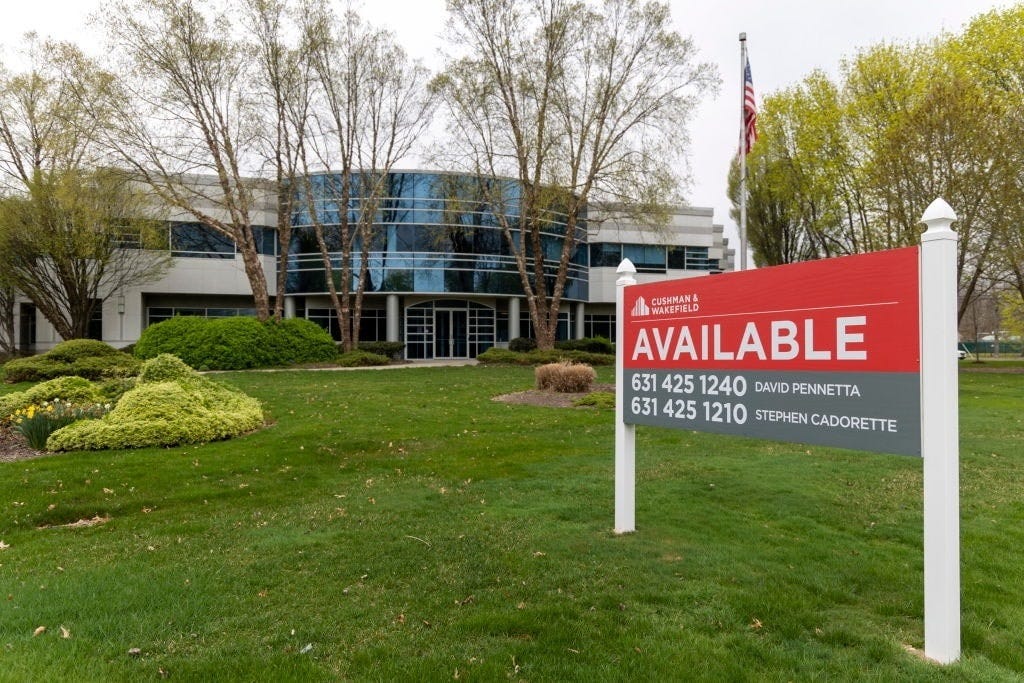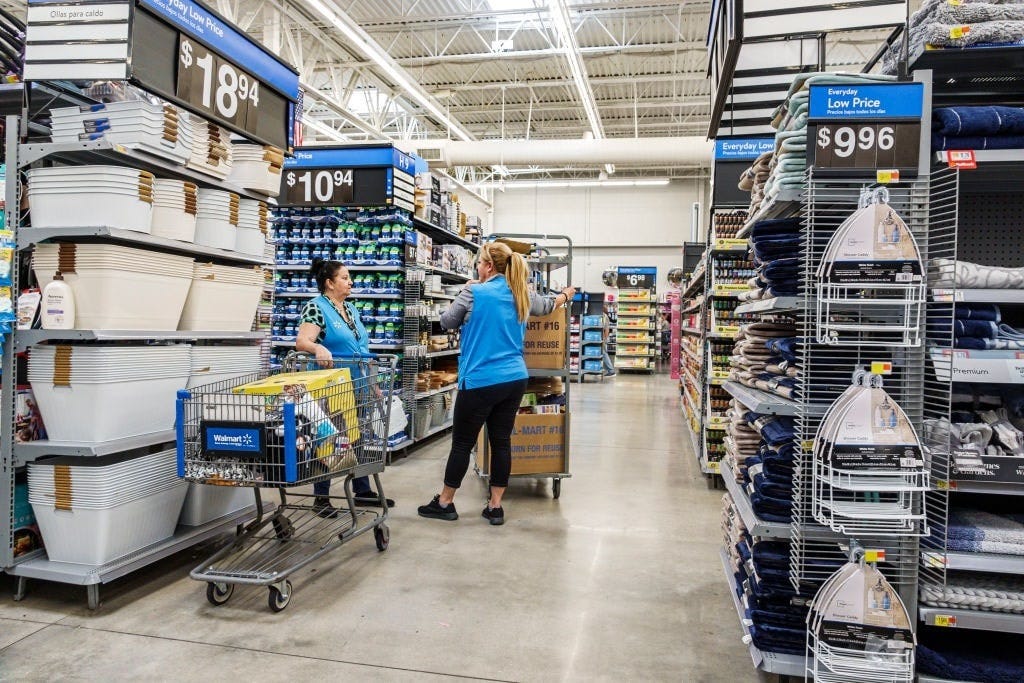Shock Waves Coming From Commercial Real Estate Crisis
Taxes, inflation, vacancies, and shoplifting becoming too hard to bear.
(Photo by: Jeffrey Greenberg/Universal Images Group via Getty Images)
A convergence of financial pressures threatens to send shock waves through America’s commercial real estate sector in 2024. As a record number of outstanding commercial mortgages mature, refinancing at nosebleed interest rates is a daunting hurdle for investors and lenders alike. Concurrently, retail and office space demand has declined as more Americans shop – and work – from home. Vacancy rates are spiking. Rising real estate taxes, shoplifting, and inflation of essentially all overhead costs threaten the profitability of what has historically been a safe haven in real estate investment.
A Commercial Loan Crisis?
(Photo by Howard Schnapp/Newsday RM via Getty Images)
Commercial loans face what could prove to be a perfect storm of financial negatives. Unlike home mortgages, most commercial loans are “interest only,” increasing the risk of default if property values deteriorate. Some lenders are willing to extend favorable refinancing terms in exchange for increased principle (reducing the loan balance and improving loan security), but more and more borrowers may balk at throwing good cash after bad – if they have the cash at all.
This lending market has already been struggling for the past two years, but many loans carried one- or two-year extension options that provided a short-term hiatus that is now waning. The Wall Street Journal summarized 2024’s gargantuan loan exposure:
“In 2023, $541 billion in debt backed by office buildings, hotels, apartments and other types of commercial real estate came due, the highest amount ever for a single year, according to the data firm Trepp. Commercial-debt maturities are expected to continue rising, with more than $2.2 trillion coming due between now and the end of 2027, Trepp said.”
The loan-sticker shock of refinancing at much higher interest rates is exacerbated by declining property values, skyrocketing shrinkage (shoplifting and other losses) in retail businesses, declines in office space demand as more workers shift to home (accelerated during COVID), and anxiety about future inflation and economic stability. The combined impact of these disparate negatives on commercial real estate poses a substantial, persistent risk to lenders and real estate investors alike, with the potential to spill over into other lending markets, stock and bond markets, and consumer prices.
Pressures on Businesses
(Photo by: Jeffrey Greenberg/Universal Images Group via Getty Images)
Many businesses have faced increasing costs in the current inflationary climate, but often these are passed on to customers. This pressure relief valve is unavailable for many commercial lenders, who face a triple whammy: vacancy rates skyrocketing, rents dropping in many market sectors, and insurance, tax, energy, and other costs inflating. Vacancy rates suggest an accelerating crisis: Office vacancy rates stood at 11.5% in the first quarter of 2020, rising to 15.1% by the second quarter of 2022, and 16.1% by the first quarter of 2023. This had climbed to an alarming 18.2% in November 2023.
Not all loans and properties are the same, with inner-city turmoil, closed stores, increasing crime and theft creating a particular vulnerability for commercial properties caught in the socio-political backlash. Indeed, eight markets account for fully half of all maturing commercial loan volume through 2024 — New York, Los Angeles, and Chicago being the top three. The industry-wide downturn is aggravated in America’s three largest cities. Other hostile market forces include struggling tech companies grappling with the double-barrel of remote work and broader industry-wide downturn: Some of the nation’s highest office vacancy rates are found in San Fransico (24.2%), Seattle (22.3%), and Austin (21.2%). Multifamily properties and industrial space are also exhibiting signs of weakness.
Progressive Policy Failures
These multiple pressures converge to wilt future prospects for commercial real estate investment, fueled by progressive policies that seed destruction instead of economic growth. Retail outlets — including vital grocery stores in low-income neighborhoods — have shuttered their doors in Chicago and Los Angeles. San Francisco and Portland resemble Mad Max film sets. What hedge fund or billionaire investor will buy up such headaches, except at a great discount? Defunding police departments increases building repair and security costs, while steadily expanded taxes on the “rich” undermine the profitability of businesses: Most leases are triple net, requiring tenants to pay a proportionate share of underlying tax hikes.
Progressive ideology disregards the mathematical and market realities of the real world. Defunding police drives up crime and retail price inflation; printing money willy-nilly for pet art projects, social justice scams, and renewables seeds core inflation; taxing the rich and doling out free money to slackards undermines hard-working businesspeople. A New York study determined that steady real estate tax increases there have been passed on to tenants, doubling from 2007 to 2017, “accounting for a rising share of total retail rent burdens.” Across the nation, rental prices are down and delinquencies are rising for commercial loans.
Vapid progressive policies destroy American businesses. Chicago’s mayor proposed starting state-run grocery stores after food retailers fled that city. Government edicts for manufacturing and purchasing solar panels and EVs are patently regressive and transfer wealth from rich to poor. Calls for ever-more taxes on the rich craft burdens that land on the shoulders of the middle and business classes. If city taxes are raised sufficiently, property owners may simply bow out and let the government operate the buildings whose tenants it has taxed into unprofitability.
Defaults on the Horizon?
Loan defaults in the commercial real estate market in 2024 could spill over into other financial markets, leave empty retail/office shells looming over urban landscapes, weaken economic growth, and deprive cities of food, goods, jobs, and a healthy tax base. This is an “economic climate” crisis.
(Previously published at Liberty Nation.)








You have no idea how bad this could be. I work in the industry. There are massive losses out there just like the farm crisis of the 1980’s. Couple those losses along with the massive losses the banks have on their books in their bond portfolio’s and the liquidity crisis we are all dealing with right now thanks to Federal Reserve and the ever changing rules from the FDIC about liquidity there is going to be some massive failures of mid size banks that scares the financial market’s. There are fools in charge folks.
" If city taxes are raised sufficiently, property owners may simply bow out and let the government operate the buildings"
There it is. The government. Funded by the taxpayer.
If only the taxpaying populous was actually represented by self-aggrandizing governments.